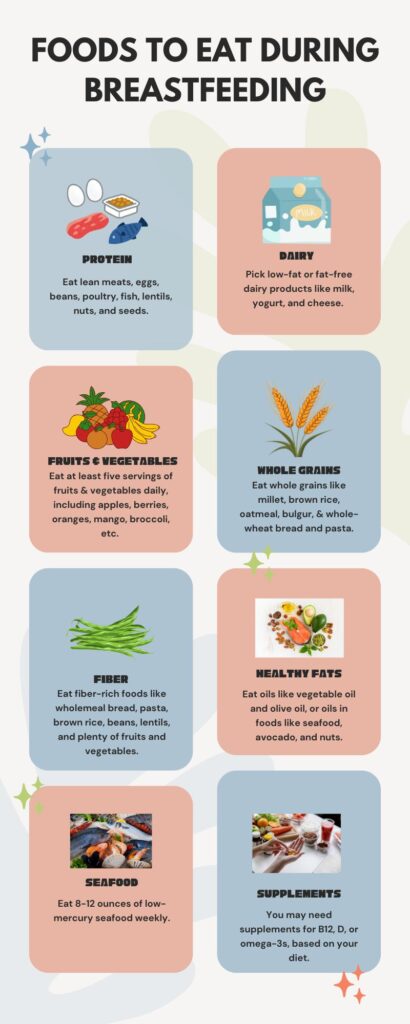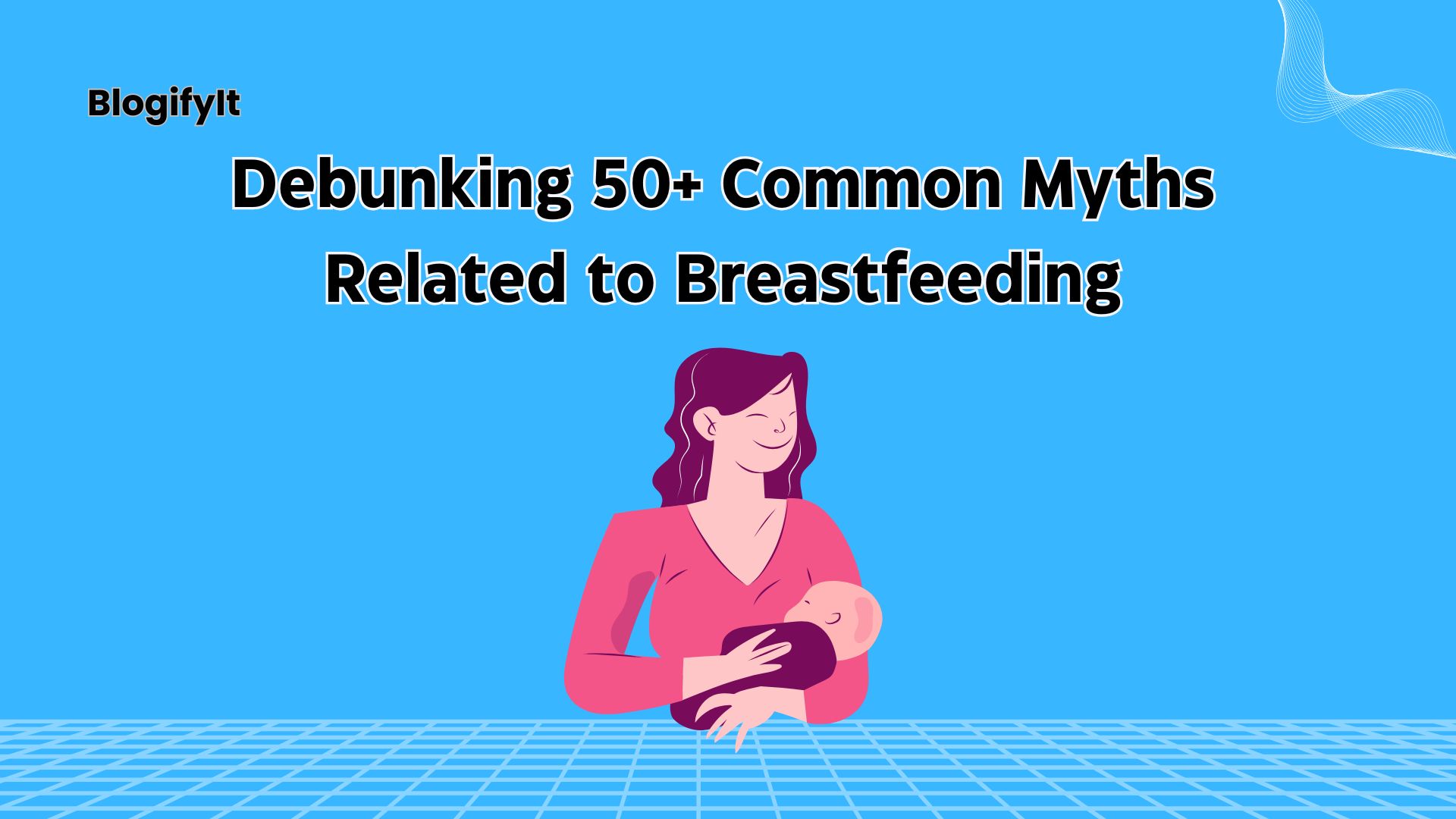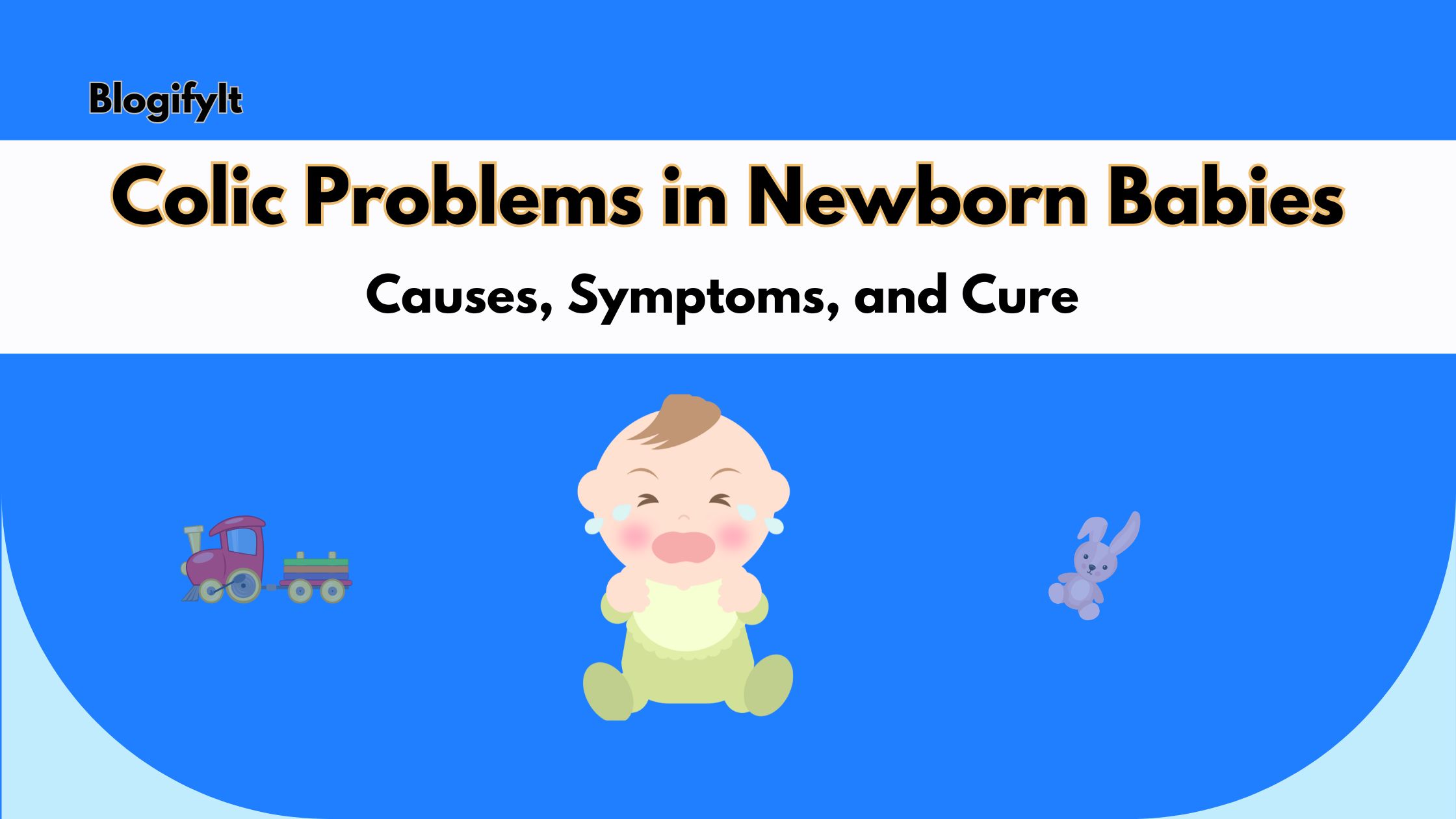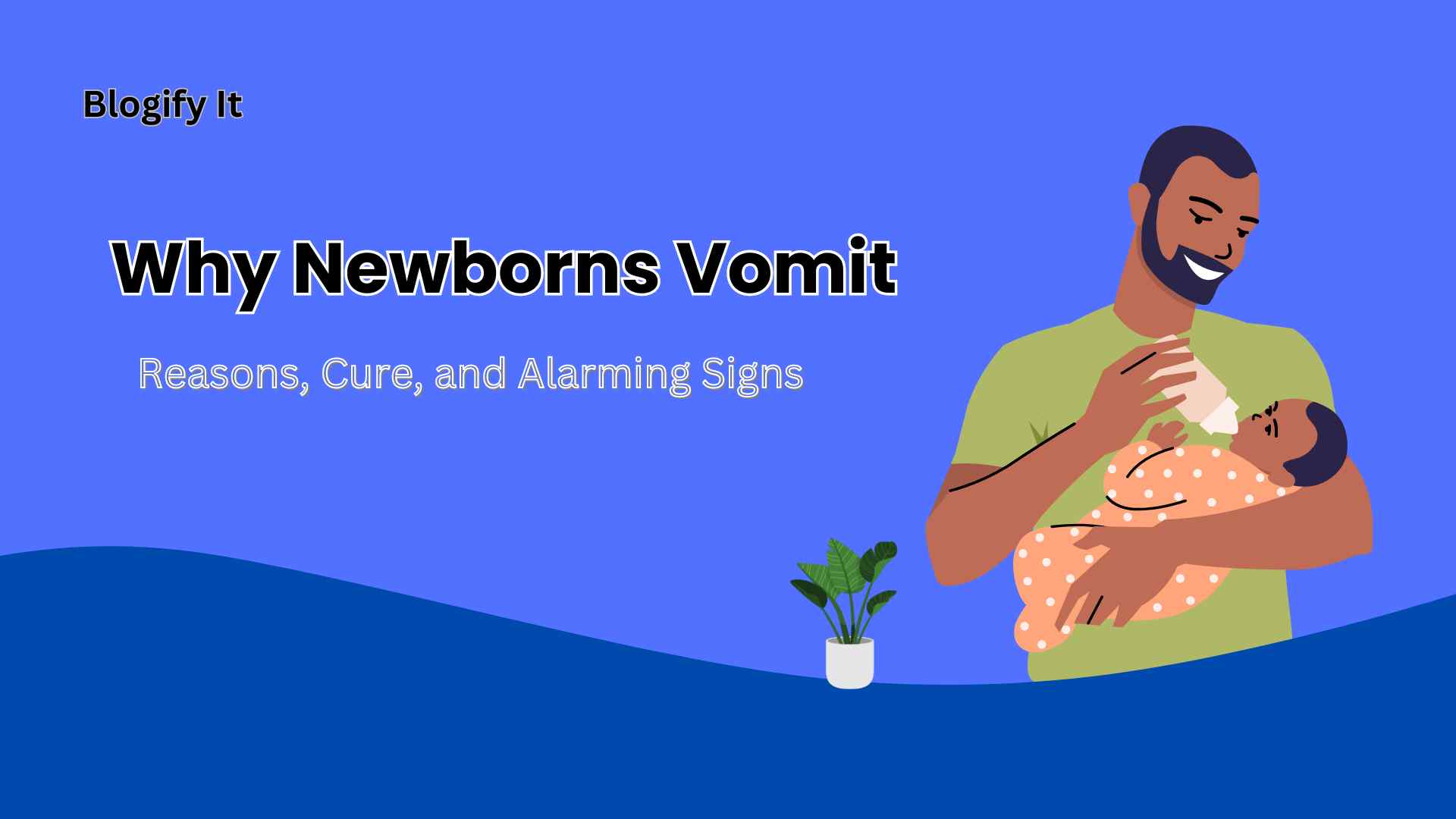Debunking 50+ Common Myths Related to Breastfeeding: Discover the Facts!
Summary: Breastfeeding has several myths associated with it, such as the idea that it’s always easy, that formula is just as good as breast milk, or that you should stop breastfeeding when your baby gets teeth. In this blog, we explore 50+ of the most common myths related to breastfeeding and set the record straight with the facts. Whether you’re a new mother or just curious, this guide helps you navigate the truths behind breastfeeding to ensure a positive experience for both you and your baby.
Breastfeeding is one of the most natural and beneficial ways to nourish a newborn. However, despite its importance, there are some common myths related to breastfeeding. From worries about milk supply to the idea that breastfeeding must always be painful, these myths can leave new mothers feeling confused and overwhelmed.
The truth is that breastfeeding is a learned experience for both mothers and babies, and the journey is different for everyone. In this blog, we’ll explore some of the most common myths related to breastfeeding. So, let’s debunk these myths and empower you with the knowledge you need for a successful breastfeeding journey!
Breastfeeding Myths Along With the Facts
So, here is a complete list of some major myths related to breastfeeding:
Myth 1: Breastfeeding is Easy.
Fact: While babies are born with the reflex to find the breast, breastfeeding can be practiced by both the baby and the mother. It’s important to learn the right positioning and latch to ensure breastfeeding goes smoothly. It’s also time-consuming, so mothers need support from family and healthcare providers to make it work.
Myth 2: Breastfeeding Always Hurts.
Fact: Some discomfort is common in the first few days of breastfeeding, especially while getting used to the process. However, breastfeeding should not be painful. If a mother experiences sore nipples or pain, it’s usually due to poor latch or positioning, both of which can be corrected with support from a lactation consultant.
Myth 3: You Should Wash Your Nipples Before Breastfeeding.
Fact: Washing your nipples before breastfeeding is unnecessary. In fact, your nipples produce natural oils and bacteria that help protect the baby’s gut and support their immune system. These bacteria help build your baby’s immune defenses, and washing could actually disrupt this natural protection.
Myth 4: Do Not Breastfeed Your Baby If They Have Diarrhea
Fact: Diarrhea in babies often means they are passing more stools than usual. However, it is important to continue breastfeeding if your baby has diarrhea. Breast milk is the best source of hydration and nutrition during illness.
Also, many doctors actually recommend increasing breast milk intake during diarrhea to ensure your baby stays hydrated and gets the necessary nutrients to recover.
Myth 5: Many Moms Can’t Produce Enough Milk.
Fact: Most mothers are capable of producing enough milk for their babies. Milk supply is primarily determined by how well the baby latches and feeds. Frequent breastfeeding and effective milk removal are key factors. If a mother is struggling with milk production, support from healthcare providers, proper nutrition, and staying hydrated can help.
Myth 6: Exercise Will Affect the Taste of Your Milk.
Fact: Exercise is beneficial for breastfeeding mothers and does not affect the taste of breast milk. Physical activity can even improve overall health, which can indirectly support milk production. It’s a misconception that exercise changes the taste or quality of milk; in reality, exercise has no such impact.
Myth 7: You Have to Breastfeed Right Away, or You Cannot Do it.
Fact: Starting breastfeeding within the first hour of birth is ideal because the baby’s natural reflexes are strongest at that time. However, it’s not the end of the road if you don’t start right away. The baby can latch on at any time, and with support, breastfeeding can be successfully established.
Myth 8: You Should Only Eat Plain Food While Breastfeeding.
Fact: Breastfeeding mothers don’t need to stick to plain food. In fact, eating a variety of foods can help the baby become accustomed to different flavors early on. Babies are already familiar with their mother’s diet from the womb. However, if a baby seems fussy after certain foods, it’s best to consult a specialist for advice.

Myth 9: You Can’t Use Formula if You Want to Breastfeed.
Fact: It’s perfectly fine to occasionally use formula and still breastfeed. Some mothers may need to supplement with formula due to various reasons, but the key is to keep breastfeeding as much as possible to maintain the milk supply. If you need guidance on combining breastfeeding and formula, a lactation consultant can help create a plan.
Myth 10: You Shouldn’t Breastfeed if You’re Sick.
Fact: In most cases, it’s perfectly safe to continue breastfeeding when you’re sick. In fact, your body’s immune system produces antibodies to fight the illness. And these are passed to the baby through breast milk, helping to protect them. Always check with your doctor for specific advice on managing illness while breastfeeding.
Myth 11: You Can’t Take Medication While Breastfeeding.
Fact: Many medications are safe to take while breastfeeding, but it’s important to check with your healthcare provider first. Always inform your doctor about any medications you’re taking, whether prescription or over-the-counter. Your doctor can help you find the safest options and advice on the best times to take medication to minimize exposure to the baby.
Myth 12: Breastfed Babies are Clingy.
Fact: Babies have different temperaments, and some may naturally be more clingy than others. Whether breastfed or bottle-fed, a baby’s need for closeness and comfort is not determined by the feeding method. Breastfeeding offers the best nutrition and emotional bonding, so it may feel like the baby seeks more closeness.
Myth 13: It’s Hard to Wean a Baby if You Breastfeed for More than a Year.
Fact: There’s no evidence that weaning is harder after one year of breastfeeding. In fact, breastfeeding for up to two years or more benefits both the baby and the mother. Each family is different, and how long you breastfeed should be based on what works best for you and your baby.
Myth 14: If You Go Back to Work, You’ll Have to Wean Your Baby.
Fact: Many mothers continue breastfeeding after returning to work. Depending on your workplace, you may have the option to pump milk during the day or breastfeed during breaks. If breastfeeding during work isn’t possible, you can pump milk at home and offer it in a bottle when you’re not around.
Even if you need to use formula at times, continue breastfeeding when you’re together—it’s still beneficial. So with this, let’s move ahead with our list of common myths related to breastfeeding.
Myth 15: You Can’t Get Pregnant While Breastfeeding.
Fact: While breastfeeding can delay ovulation in some women, it is not a reliable form of birth control. If you’re breastfeeding and don’t want to get pregnant, it’s important to talk to your doctor about contraception options. Avoid birth control pills that contain estrogen while breastfeeding, as they may affect your milk supply.
Myth 16: You Need to Toughen Your Nipples Before Your Baby is Born.
Fact: Your body naturally prepares for breastfeeding. There’s no need to toughen your nipples before birth. In fact, trying to do so may irritate the skin or interfere with normal lactation. Your body will adapt to breastfeeding once your baby arrives.
Myth 17: Small Breasts Don’t Produce as Much Milk as Large Breasts.
Fact: Breast size has no impact on your ability to produce milk. Milk production is based on glandular tissue and how effectively your baby is breastfeeding. It’s not about the size of your breasts but how well milk is removed that influences supply.
Myth 18: Breastfeeding Will Ruin the Shape of Your Breasts.
Fact: Most women find that their breasts return to their pre-pregnancy size and shape after they stop breastfeeding. Other factors like aging, gravity, and weight changes have a much greater impact on breast shape than breastfeeding itself.
Myth 19: Sexual Arousal While Breastfeeding is Abnormal.
Fact: It’s normal for some women to experience sexual arousal during breastfeeding. Breast stimulation is an important part of sexual activity, and the hormone oxytocin released during breastfeeding is the same hormone involved in orgasm. These reactions are natural and nothing to feel ashamed about.
Myth 20: All Babies Should be Weaned Before Their First Birthday.
Fact: The decision of when to wean is personal and varies based on family preferences and cultural norms. The American Academy of Pediatrics recommends breastfeeding exclusively for the first 6 months, and continuing breastfeeding for two years or longer is beneficial for both mother and baby.
Myth #21: Breast Milk Does Not Contain Enough Iron
Fact: Breast milk contains sufficient iron to meet your baby’s needs for the first six months. Newborns are born with a store of iron from the placenta, which lasts around four months. After this, breast milk continues to provide enough iron for the baby and iron-fortified foods are recommended only after six months of age, when solid foods are introduced.
Myth 22: Breastfeeding is Painful.
Fact: Breastfeeding should not be painful. Some soreness is common in the early days as your body adjusts, but pain is usually a sign that something isn’t right, like improper latch or positioning. A lactation consultant can help resolve these issues.
Myth 23: You Won’t Make Enough Milk in the First Few Days.
Fact: In the first few days after birth, your body produces colostrum, nutrient-rich milk that’s small in volume but packed with everything your baby needs. This “liquid gold” is all your newborn needs for the first few days, and breastfeeding frequently helps build your milk supply for the weeks ahead.
Myth 24: Breastfeeding Makes it Harder for Dad and Other Family Members to Bond With the Baby.
Fact: Breastfeeding doesn’t prevent other family members from bonding with the baby. Dad and others can still bond by holding the baby, talking to them, or doing skin-to-skin contact. Once breastfeeding is established, the mom can pump milk, and others can feed the baby while still fostering bonding.
Myth 25: Breastfeeding in Front of Others is Rude. No One Should See That.
Fact: There is no shame in breastfeeding your baby when they’re hungry, whether in public or private. If you prefer, you can use a cover, but it’s not necessary. Many places have laws that protect your right to breastfeed wherever you are legally allowed to be.
Myth 26: Breastfeeding is Hard Work and Takes Too Much Time and Energy.
Fact: Breastfeeding takes time, but it’s more convenient than preparing bottles. You don’t need to worry about sterilizing bottles, mixing formula, or heating water. Your breastmilk is always ready at the right temperature, making it a quick and efficient way to feed your baby.
Myth 27: Once a Baby Takes a Bottle, it Won’t Go Back to the Breast.
Fact: Most babies can switch between breast and bottle without problems. While some babies may show a preference for one or the other, many can happily alternate. If you’re concerned about your baby’s preference, a lactation consultant can help.
Myth 28: Using Formula Won’t Affect Your Milk Supply.
Fact: Using the formula in place of breastfeeding can impact your milk supply because your body produces milk based on demand. If you skip feedings or use formula regularly, your body will produce less milk. Pumping during missed feedings helps maintain the milk supply.
Myth 29: Moms Who Breastfeed Don’t Get Enough Sleep.
Fact: Another one of the common myths related to breastfeeding is that moms who do breakfast don’t get sufficient sleep. However, studies show that breastfeeding moms often get more sleep because they don’t have to get up to prepare bottles.
Breastfeeding allows moms to quickly feed their babies without the hassle of warming up the formula, helping them get back to sleep faster.
Myth 30: All Moms Feel Happy and Blissful After Giving Birth.
Fact: Up to 80% of new moms experience the “baby blues,” which can include sadness, irritability, and fatigue in the days after birth. This usually passes within two weeks. If the symptoms persist or worsen, it could be postpartum depression, which is treatable with support and counseling.
Myth 31: If Your Baby Cries, It Probably Means You Are Not Making Enough Milk
Fact: Babies cry for many reasons, not just hunger. They might be too hot, too cold, tired, or need a diaper change. If you’re concerned about milk supply, check if your baby is having enough wet diapers and gaining weight. If you’re still worried, reach out to your pediatrician or a lactation consultant.
Myth 32: If You Smoke, You Can’t Breastfeed.
Fact: When we talk about the things to do during your 1st, 2nd, and 3rd trimester, SMOKING is strongly discouraged because it can harm both your pregnancy and your baby’s development. And same is suggested even if you are breastfeeding. You should definitely shouldn’t do it. However, if you do smoke, breastfeeding is still better for your baby than formula. Breastmilk offers protection against illness. If you smoke, wait until after feeding to have a cigarette, and make sure to smoke away from your baby in a well-ventilated area.
Myth 33: It’s Not Worth Learning to Breastfeed if You’re Going Back to Work.
Fact: It’s definitely worth learning to breastfeed, even if you plan to go back to work. Many employers are required by law to provide time and space for breastfeeding or pumping. Breastfeeding has lifelong benefits for both mom and baby, so every drop counts.
Myth 34: You Shouldn’t Nurse Your Baby to Sleep.
Fact: It’s completely normal for babies to nurse to sleep. This can be a soothing and comforting way for babies to fall asleep. As long as your baby is feeding well and getting enough nutrition, there’s no harm in letting them fall asleep at the breast.
Myth 35: You Can’t Breastfeed if You’ve Had Surgery On Your Breasts.
Fact: Many women who’ve had breast surgery can still breastfeed. If you’ve had surgery, a lactation consultant can help you figure out the best ways to ensure successful breastfeeding and monitor your milk supply.
Myth 36: Giving Babies Formula Will Help them Sleep Better.
Fact: Formula may make some babies sleep longer, but it’s because it takes longer to digest. Breastfed babies may wake more often, but they digest milk more easily. Breastfeeding also has health benefits, including a reduced risk of SIDS.
Myth 37: Formula Is as Good as Breast Milk.
Fact: Breast Milk is uniquely designed to meet your baby’s needs, providing nutrition, antibodies, and protection against illnesses. It contains more vitamins, minerals, and anti-viruses than formula. Plus, it’s free, always available, and safe for your baby to drink anytime.
Myth 38: Breastfeeding Spoils Babies if You Do it For Too Long.
Fact: There’s no evidence that extended breastfeeding has any negative effects. In fact, breastfeeding helps babies form healthy, trusting bonds with their mothers and provides ongoing health benefits for both mother and child.
Myth 39: Adding Cereal to the Bottle Will Help Your Baby Sleep Through the Night.
Fact: Babies shouldn’t start solid foods until around six months, including cereal. Adding cereal to a bottle doesn’t help with sleep and can increase the risk of choking. Early introduction of solids may also increase the risk of obesity.
Myth 40: Babies Don’t Need Breast Milk After They Start Eating Solid Food.
Fact: Breastmilk should still be the primary source of nutrition for babies through their first year. As they start solids around 6 months, breastmilk continues to provide important nutrients, antibodies, and protection from illness.
Myth 41: You Should Stop Breastfeeding When Your Baby Gets Teeth.
Fact: Having teeth doesn’t mean you have to stop breastfeeding. While some babies might bite, most will do so only if they’re done nursing. If your baby does bite, stay calm, gently unlatch, and say “no” firmly to discourage the behavior.
Myth 42: Once Your Baby Turns a Year Old, Breastfeeding is Just For Comfort.
Fact: Breastfeeding still provides valuable nutrition after your baby turns one. Your milk continues to change to meet your toddler’s needs and offers protection against illness. The American Academy of Pediatrics recommends breastfeeding for at least two years or longer as long as it’s beneficial for both mother and child.
Myth 43: Pumping is a Good Way of Knowing How Much Milk You Have.
Fact: It’s normal not to pump as much milk as your baby would drink. Babies are much more efficient at removing milk from the breast than any pump. Focus on your baby’s wet diapers, growth, and overall well-being to gauge if they’re getting enough.
Myth 44: Breastfeeding Moms Can’t Have a Social Life.
Fact: You can still enjoy a social life as a breastfeeding mom! If you’re out with your baby, you always have breastmilk ready. If you’re leaving your baby with a caregiver, you can leave pumped milk or formula. Staying socially connected is important for your mental health.
Myth 45: You Have to “Pump and Dump” After You Drink Alcohol.
Fact: If you have an occasional drink, there’s no need to pump and dump. Simply wait about two hours per alcoholic beverage before breastfeeding. If you’re drinking more, you can pump ahead of time to ensure your baby has milk while you wait for the alcohol to clear your system.
Myth 46: If Babies Feed a Lot, That Means They Aren’t Getting Enough Milk.
Fact: Breastfed babies feed more frequently because breast milk is digested quickly. It’s completely normal for newborns to eat every 2-3 hours, even if they’re feeding often.
Myth 47: Giving the Breast a “Rest” Will Ensure More Milk.
Fact: The more you nurse, the more milk you make. Skipping feedings will decrease your milk supply. Regular breastfeeding helps maintain a steady milk supply.
Myth 48: Never Wake a Sleeping Baby to Breastfeed.
Fact: Babies should generally be fed every 2-3 hours. If your baby is sleeping longer than that during the day, wake them up to keep your milk supply on track. Don’t let them go longer than 4.5 hours without feeding during the day.
Myth 49: Breastfeeding Comes Naturally to Babies
Fact: Babies are born with two reflexes – the suck reflex and the rooting reflex. The sucking reflex leads babies to suck on anything that comes into their mouth, while the rooting reflex causes them to turn towards anything that strokes their cheek or mouth.
While these reflexes help babies find the breast, both babies and mothers often need to learn how to breastfeed effectively. They can support each other and naturally find a breastfeeding rhythm with practice.
Myth 50: Exercising Before Breastfeeding Can Affect Milk Supply
Fact: Exercising does not negatively affect milk supply. In fact, moderate exercise can help mothers stay fit and reduce stress, which can actually support breastfeeding. Research shows that physical activity can even improve the quality of breast milk.
So, if you enjoy exercising, feel free to continue your routine. Regular exercise has no adverse effects on your milk production or your baby’s health.
Myth 51: You Can Make Milk If You Drink Milk
Fact: Drinking milk does not directly impact your ability to produce breast milk. While hydration is important for milk production, it can come from any fluid, not just milk.
Following a healthy, balanced diet that includes a variety of nutrients will ensure your body has everything it needs to produce breast milk. If you don’t get the right nutrients, your body will take them from your reserves to produce milk, which can lead to nutrient deficiencies if not properly addressed.
Myth 52: Breast Milk Production is Not Enough in Many Women
Fact: Many mothers worry that they aren’t producing enough milk, but this is often not true. The issue is usually with milk output, not production. Factors like nipple shape and size or poor latch can contribute to low milk output.
To assess whether your baby is getting enough milk, track their weight gain, monitor how many wet diapers they have, and pay attention to their sucking and swallowing patterns during feeds.
Final Thoughts
That’s all for the blog. These were the common myths related to breastfeeding. However, many of these beliefs are untrue. Breastfeeding is a unique journey for each mother and baby, and the key to success lies in understanding, patience, and support. While challenges may arise, most breastfeeding concerns can be managed effectively with the right knowledge and resources.
Remember, the most important thing is that both you and your baby are healthy and happy. Don’t let myths and misconceptions stand in the way of your feeding choices. Let us know how many of these you’ve heard and how many are new to you.




